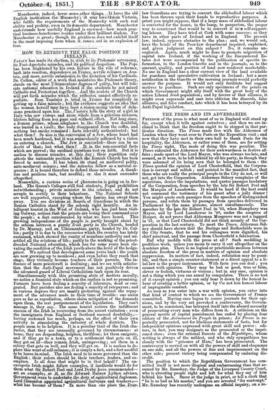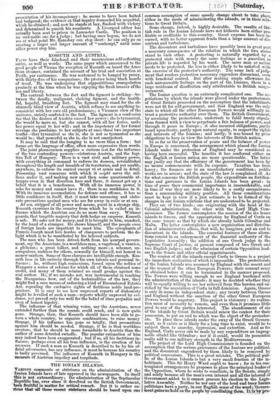THE PRESS AND ITS ADVERSARIES.
FuExpent of the press is what most of us in England will stand up for, except when it tells against ourselves ; and then we are in- elined to think that the freedom ought to be stopped in that par- ticular direction. The Times made free with the Aldermen of London when they went over to Paris on the Exposition visit ; and now that they have met in their own hall to thank Paris for ite hospitality, the Aldermen, or rather some of them, are for setting the Times right. The mode of doing this was peculiar. The limes ridiculed the Aldermen for their awkwardness in festive af- fairs ; made sport of the Lord Mayor, who was always too late, and seemed, as it were, to be left behind by all his party, as though they were ashamed of its being seen that he belonged to them : the Times, quoted the opinion of Lord Chesterfield, that the Corpora- tion is corrupt and selfish ; and pointed to the manifest fact, that those who are really the principal people in the City do not, or will not, get into the Corporation. Alderman Sidney complains of the aspersions, denies the imputations, and quotes passages laudatory of the Corp.oration, from speeches by the late Sir Robert Peel and the Marquis of Lansdowne. It would be hard if the host could not command the testimony of his guest after a jolly dinner ! You might quote such passages from the speeches of distinguished Persons, and refute them by passages from speeches delivered in Parliament by the same persons, almost simultaneously. The speeohes by the late. Sir Robert Peel in '43, when Humphery was Mayor, and by Lord Lansdowne in '48, under the auspices of Hooper, do not prove that Alderman Musgrove was not a laggard in '51, or that Lord Chesterfield did not think meanly of the Cor- poration in the last century. To meet the Times, Alderman Sid- ney should have shown that the Barings and Rotjasohilds were in the City Senate, that he and his colleagues were dignified, his chief punctual, and the passage from Chesterfield a fabrication.
But why meddle with the press at all ? Such meddling is profitless work, unless you mean to carry it out altogether on the Austrian plan. There is no logical or practicable medium between absolute freedom of the press in matters of opinion and absolute suppression. In matters of fact, indeed, refutation may be possi- ble, and then a simple counter-statement or a direct appeal to a li- bel law is the proper instrument. With facts you can deal ; you cannot with opinions. They may be bad or good, true or false, clever or foolish, virtuous or vicious ; but in any ease, opinion is i not a thing which you can annul by compulsion. There is no test of it except opinion ; you can only bear it down by the honest la- bour of creating a better opinion, or by the not less honest labour of impregnable conduct. As soon as you enter into a war with opinion, you enter into that kind of contest to which we see the Government of France committed. Having once begun to coerce journals for their opi- nions, and by the very act provoked a controversy, the Govern- ment, to be consistent, has betrayed itself into the absurd necessity of prosecuting every man who differs from it. A criticism on the general merits of capital punishment has ended by placing four editors of the Avenement du Peuple in prison; La Presse is re- peatedly prosecuted, not for libellous statements of facts, but for independent opinions expressed with great skill and power : edi- tors, in fact, you may designate as the prosecuted or the impri- soned class ; even the rational Bareste of the _Republique, whose writing is always of the mildest, and who Only sympathizes too closely with the "prisoner of Ham," has been prosecuted. The controversy is carried on with all the powers of skill and eloquence on one side, and all the powers of fine and imprisonment on the other side; present victory being compensated by enduring dis- credit.
The position to which the Republican Government has com- mitted itself is not more illogical and embarrassing than that as- sumed by Mr. Itamshay, the Judge of the Liverpool County Court, who is arresting people right and left for what they say of him behind his back. Sneer at the judge in print, or tell a clerk that "he is as bad as his master," and you are arrested "for contempt." Mr. •Itamshay has recently undergone an official inquiry, on a re- presentation of his incompetency : he seems to have been baited and badgered; the evidence at that inquiry demanded his acquittal, which he obtained; and_now he stands at bay, flushed with victory and determined to punish his assailants. A Liverpool editor has actually been sent to prison in Lancaster Castle. The position is an Untenable one for a judge ; but having once begun, we do not see at what point Mr. llamshay can stop short: he can only go on creating a larger and larger amount of " contempt," until some other power stop him.



























 Previous page
Previous page